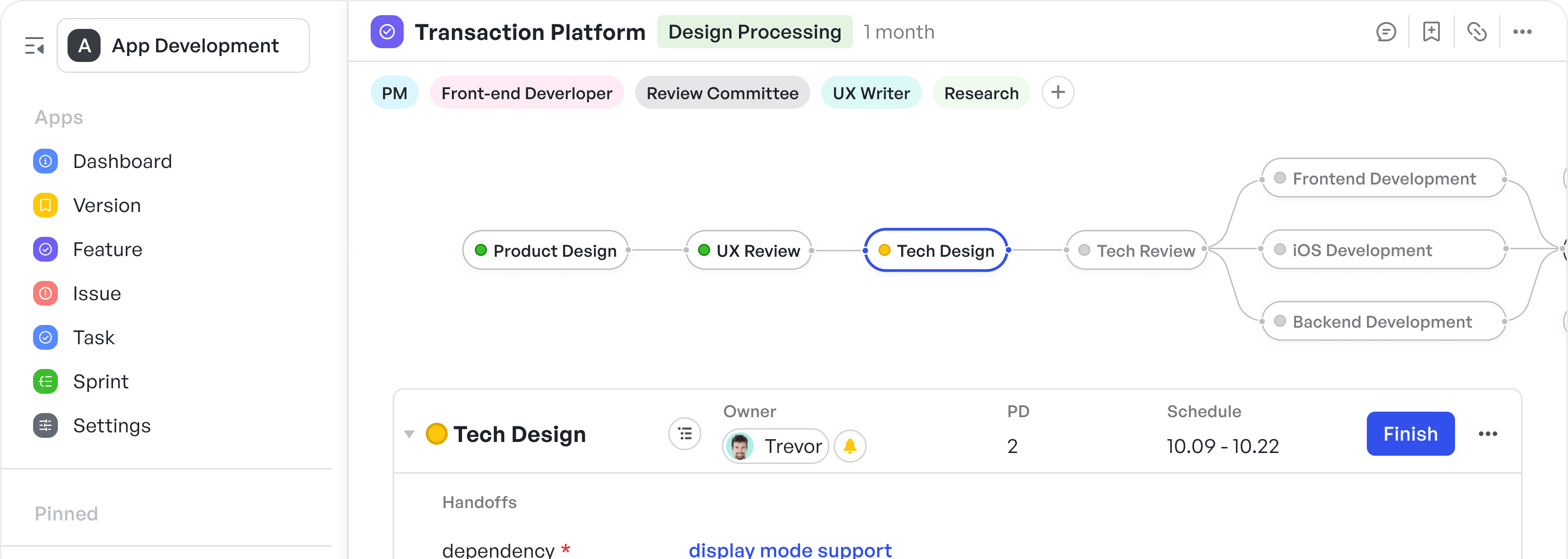Top 5 Product Management Certification Which Pays Off

Ever notice how some product managers seem to scale (pun intended) through their careers while others plateau? What sets those fast-trackers apart?
Work experience?
Luck?
Connections?
Yes, but not completely. The biggest advantage is strategic certification.
According to the 2024 State of Product Management & Marketing Report by Pragmatic Institute, top-earning product managers (those making $200K+) thoughtfully choose certifications that tackle tomorrow’s challenges.
On average, these individuals hold 7+ certifications. That stat alone can make you feel like you’re behind. But not all certifications carry the same weight.
You scroll through course pages and wonder if that $4,000 investment will boost your career or just your credit card balance.
That’s why we have done the legwork for you.
After speaking with dozens of hiring managers, and analyzing job requirements across industries, here are five certifications worth your investment this year. We have also added one bonus pick that consistently delivers outsized value. Hands-on projects, insider access to industry networks, or skills in emerging areas like AI, I’ve got you covered!
However, even the best certifications fall short if you don’t know how to apply the knowledge.
Certifications teach frameworks, but product management tools like Meegle give you the chance to use your PM skills: visualizing workflows, improving team collaboration, and implementing what you’ve learned into your daily practice.
Let’s explore the top product management certifications, what they uniquely offer, and how to choose one that prepares you for the future.
New to PM? Start with our comprehensive guide to product management.
Product management certification: A comparison
| Certification | Format and Duration | Hands-on Experience | Networking and Community | Best For | Cost |
|---|---|---|---|---|---|
| Product School – PMC | Small classes (avg. 20 students); cohort-based | Real-world projects with feedback from instructors at top tech companies | 100K+ Slack community, AMAs, hiring manager access | Career switchers and early PMs seeking mentorship and industry credibility | $2,999 (Single); $4,999/year (Unlimited) |
| Pragmatic Institute | Framework-focused; modular | Templates, exercises, simulations; market-driven | 36K+ alumni, podcasts, ebooks, forums | Experienced PMs wanting strategy-first tools to scale products | $3,685 |
| BrainStation – PMC™ | Live online; project-based | Breakout rooms, real-time feedback, portfolio-ready projects | 30K+ alumni, Slack, career events | Visual learners who thrive in hands-on, collaborative environments | $3,250 |
| AIPMM – CPM | 3-day intensive + exam | Academic, comprehensive product lifecycle coverage | Formal recognition, especially in enterprise | PMs in traditional industries seeking credentials with global recognition | $125/year (membership); $395–$520 exam |
| IBM Product Manager Certificate | Self-paced online (Coursera) | Digital product dev, Agile, data-driven methods | Limited; platform-based discussion | Aspiring PMs needing flexible, affordable training | $39/month |
| Product Coalition (Bonus) | Free, self-directed platform | Practical articles, discussions, publishing, peer feedback | 7K+ Slack members, global collaboration | PMs seeking ongoing community-led learning without formal certification | Free |
The top 5 product management certifications for 2025
Whether you’re breaking into product management or upskilling, these certifications offer the skills and networks to succeed. Each is designed with practical learning and industry relevance, perfect for product and project managers aiming to tackle real-world challenges.
1. Product School – Product Manager Certification (PMC)
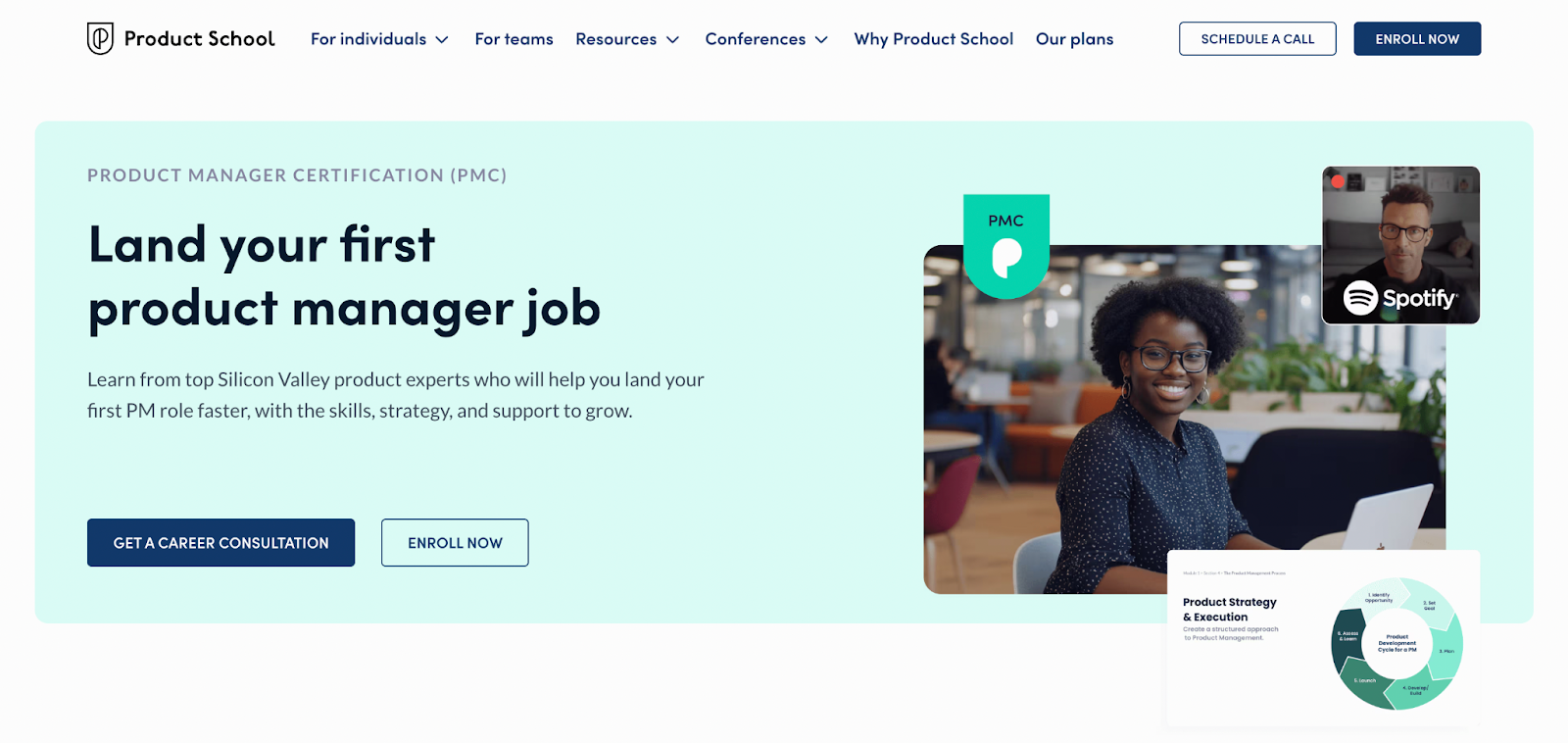 Product School’s Product Manager Certification (PMC) is a popular certification for aspiring product managers (Source: Product School)
Product School’s Product Manager Certification (PMC) is a popular certification for aspiring product managers (Source: Product School)Product School’s PMC is the best choice for anyone serious about product management. With two levels—Product Manager Certificate for beginners and Product Leader Certificate for experienced PMs—it’s built for every career stage.
Taught by product leaders from Google, Spotify, and Netflix, this PM course emphasizes hands-on learning. You’ll work on real projects, and get feedback from instructors who ship products daily.
Small classes (around 20 students) ensure personal attention, and the 100,000+ Slack community connects you to hiring managers, mentors, and peers through events and AMAs. Alumni at Meta and Salesforce prove its industry clout.
- Course overview: The curriculum covers opportunity assessment, product strategy, user research, UX/UI, and launching products.
- Eligibility: No strict prerequisites; beginner level suits career switchers or new PMs
- Course structure:
- Duration: 6-12 weeks, depending on level
- Format: Online or in-person
- Learning methods: Interactive lectures, real-world projects, personalized feedback
- Format: Online or in-person
- Duration: 6-12 weeks, depending on level
⭐ Alumni testimonial:
“This certification covers everything you need to know about Product Management to jumpstart and land your first PM job. It isn’t all theory, you get to apply everything you learn to your own project and the instructors provide feedback to help you improve.” – Medha Ghatikesh, Product Manager at Meta
2. Pragmatic Institute – Product Management Certification
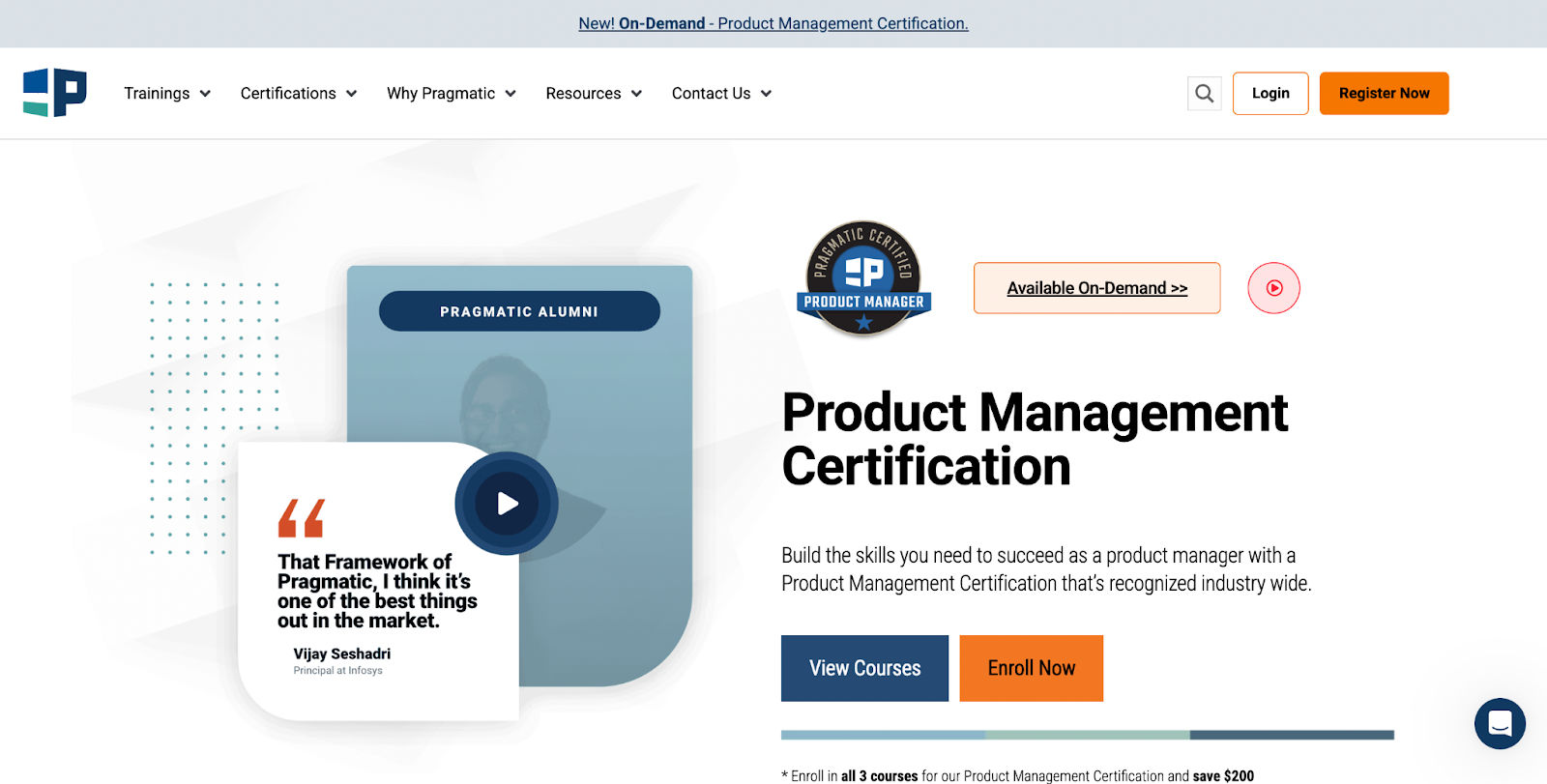 Pragmatic Institute’s Product Management Certification, featuring course details and alumni testimonials (Source: Pragmatic Institute)
Pragmatic Institute’s Product Management Certification, featuring course details and alumni testimonials (Source: Pragmatic Institute)Pragmatic Institute is a trusted name for experienced PMs looking to sharpen their strategic edge. Its certification focuses on market-driven frameworks, making it ideal for scaling products effectively.
The program’s strength lies in its practical approach. You’ll use templates and exercises that mirror real PM challenges, preparing you to make data-driven decisions.
Pragmatic’s online community provides ongoing access to resources, events, and peer support. With a 36,000+ alumni network, you’ll tap into podcasts, ebooks, and peer forums for continous learning.
- Course overview: Includes foundational PM concepts, go-to-market strategies, prioritization, and launches
- Eligibility: Best for PMs with some experience seeking advanced tools
- Course structure:
- Duration: 1 week
- Format: Online, in-person, or on-demand
- Learning methods: Lectures, exercises, simulations
- Format: Online, in-person, or on-demand
- Duration: 1 week
⭐ Alumni testimonial:
“This certification dives deep into transforming “what we could do” into “what we should do.” Through hands-on team casework, strategic framing exercises, and tools like the strategy matrix and decision trees, I learned how to align initiatives with market realities and company capabilities. 🧠 A major highlight? Understanding how to distinguish implicit vs. explicit strategies, and how to confidently prioritize opportunities based on buyer impact, competitive advantage, and investment levels. As an aspiring strategy consultant, this experience has sharpened my ability to evaluate product opportunities not just through an execution lens but through a truly strategic, market-driven approach.” – Gazi S. Hossain, Engineering Consultant at WSP
3. BrainStation – Product Management Certification (PMC™)
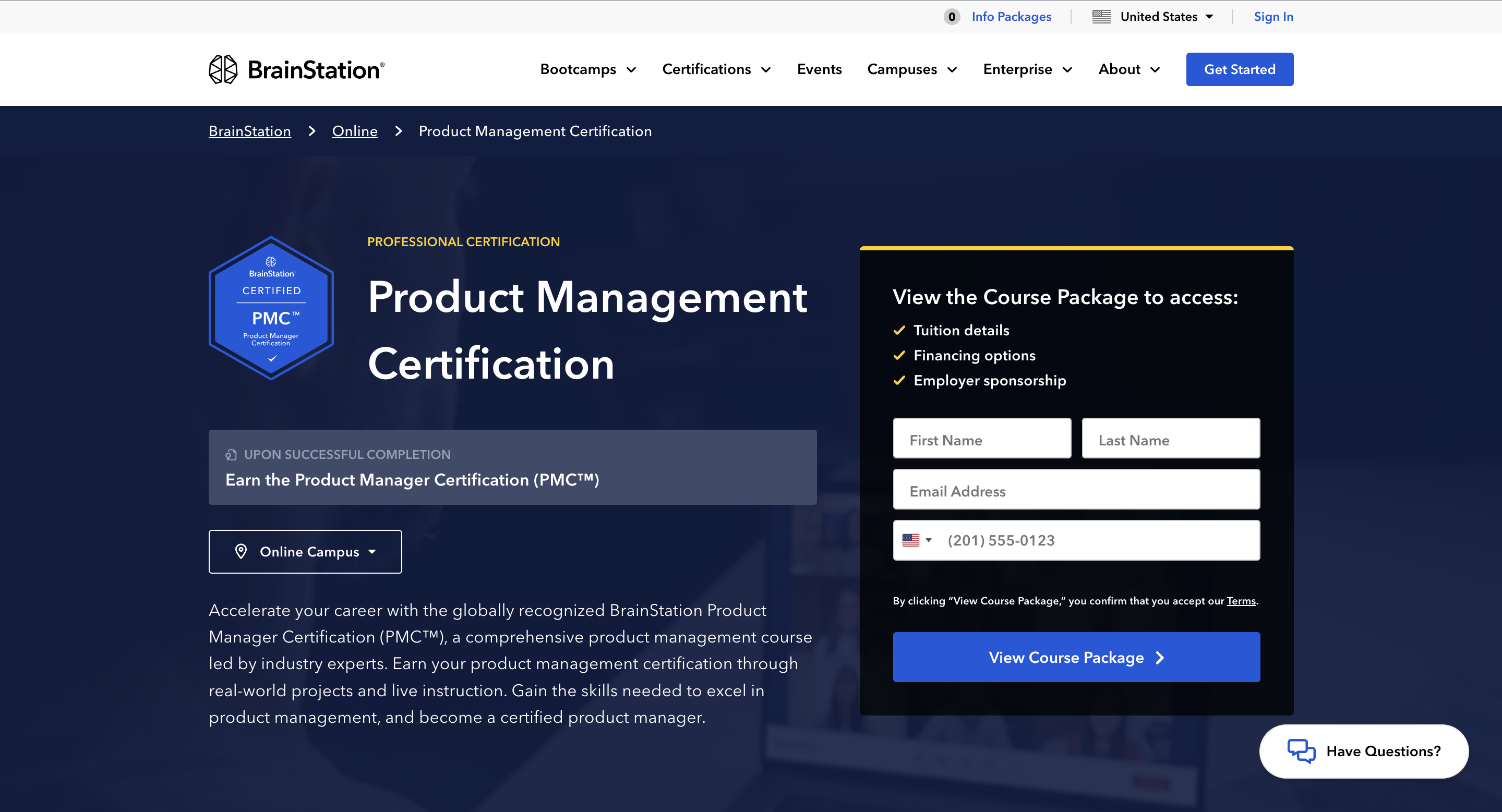 BrainStation’s Product Management Certification home page highlighting course features, online campus access, and enrollment form (Source: BrainStation)
BrainStation’s Product Management Certification home page highlighting course features, online campus access, and enrollment form (Source: BrainStation)BrainStation’s Product Management Certification is ideal for visual learners and builders. Led by product leads from Amazon, Meta, and Microsoft, this certification is globally recognized by top companies such as Uber, Slack, Airbnb, and more.
You’ll build product plans in breakout rooms, and receive peer-support to hone your skills. By the end of the course, you’ll have portfolio-ready projects.
The 30,000+ global alumni network on Slack offers insider access to career events and peer support.
- Course overview: Focuses on customer research, agile methodologies, prototyping, and product analytics.
- Eligibility: Beginner-friendly
- Course structure:
- Duration: 12 weeks
- Format: Instructor-led online classes, with interactive workshops and portfolio development
- Learning methods: Workshops, group projects, portfolio development
- Format: Instructor-led online classes, with interactive workshops and portfolio development
- Duration: 12 weeks
⭐ Alumni testimonial:
“The Product Management course really gives you an opportunity to test out and apply new skills and concepts while getting support and feedback from helpful instructors.” – Emma Väggö, Global Head of Publisher Programs at TikTok
4. AIPMM Certified Product Manager (CPM)
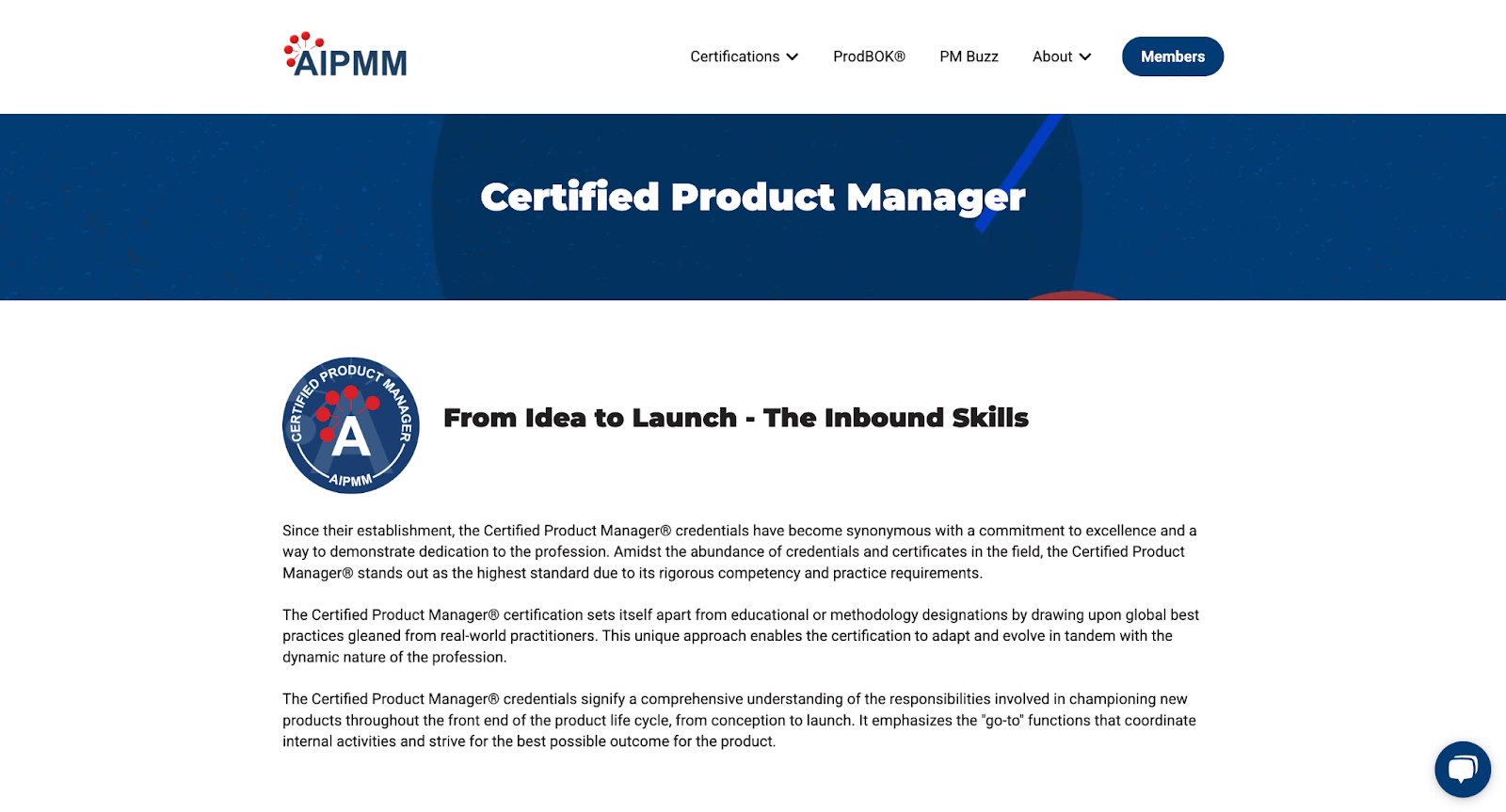 AIPMM’s Certified Product Manager certification page, highlighting credential value, skill focus, and professional standards (Source: AIPMM).
AIPMM’s Certified Product Manager certification page, highlighting credential value, skill focus, and professional standards (Source: AIPMM).The AIPMM’s Certified Product Manager certification is a solid pick for PMs in enterprise, manufacturing, or government roles where formal credentials matter. It’s academically rigorous, covering the entire product lifecycle.
The compact format and exam-based structure make it ideal for those seeking a credentials-first approach. Peer learning during the course fosters connections, though alumni engagement is limited compared to others.
An Indeed career guide notes, “The AIPMM is the largest globally recognised association for product managers, with a presence in more than 65 countries.”
- Course overview: The curriculum is comprehensive, ensuring candidates are equipped with both theoretical and practical skills, including stakeholder management, competitive analysis, market analysis, lifecycle management, strategic planning, and market data modelling.
- Eligibility: Requires some PM or related experience
- Course structure:
- Duration: 3 days intensive
- Format: Live instructor or self-study online (through Productside) course(s)
- Learning methods: Lectures, case studies, exam (74%+ to pass)
- Format: Live instructor or self-study online (through Productside) course(s)
- Duration: 3 days intensive
⭐ Alumni testimonial:
“The AIPMM The Association of International Product Marketing and Management certification assessment (and associated training by Productside ) was one of the bigger career booster / confidence builders that I have had the pleasure to learn from. Highly recommend their books and materials.” – Paelle M. Powell CPM, Founder and CEO of Rosie Systems Inc.
5. IBM Product Manager Professional Certificate (Coursera)
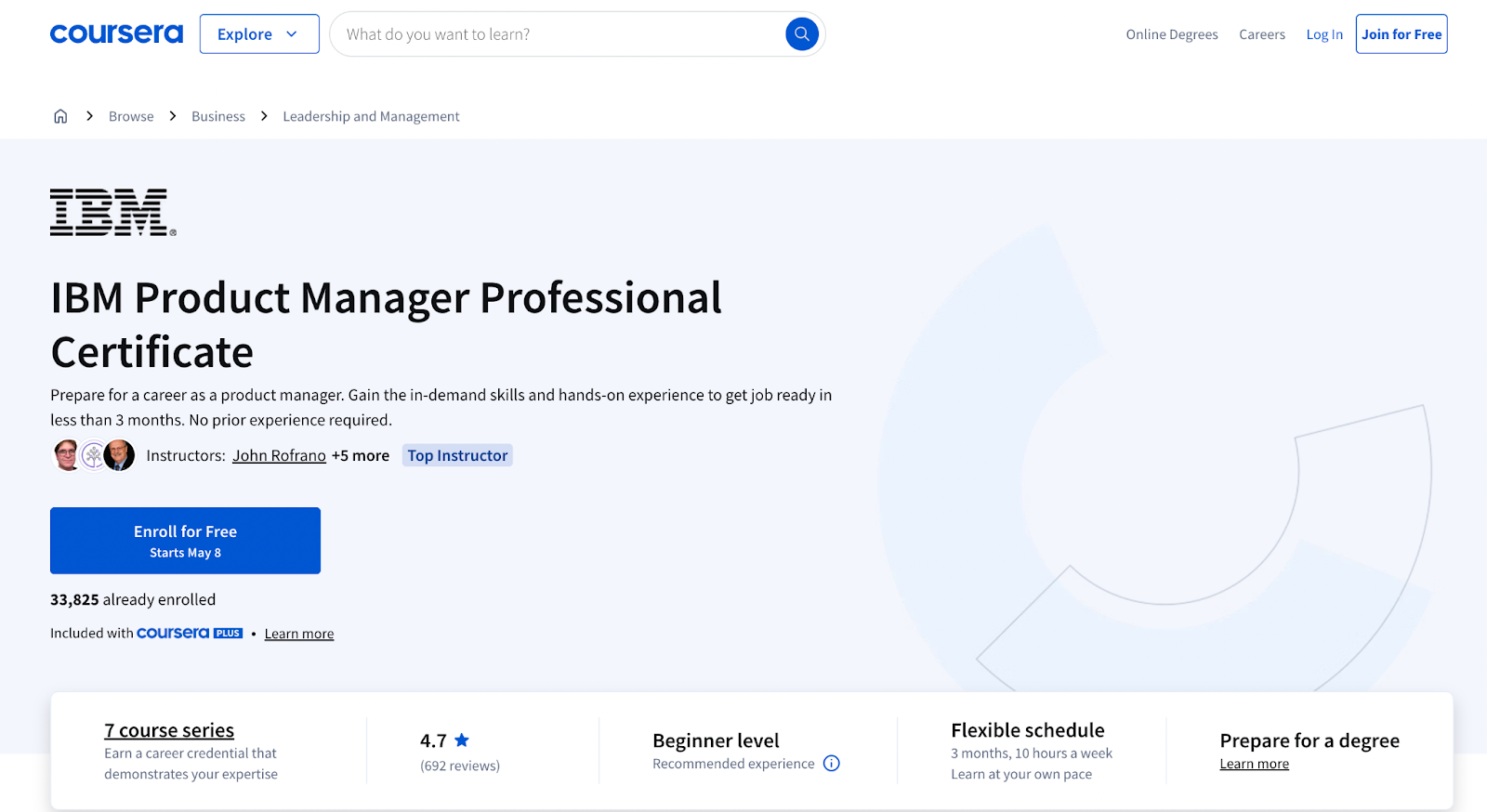 IBM Product Manager Professional Certificate course page on Coursera, featuring a 7-course beginner series with flexible scheduling (Source: Coursera).
IBM Product Manager Professional Certificate course page on Coursera, featuring a 7-course beginner series with flexible scheduling (Source: Coursera).IBM’s Product Manager Professional Certificate on Coursera is an accessible, career-focused program designed for anyone aiming to break into product management, especially those new to the field.
This course focuses on applied, hands-on learning with guidance from IBM’s product leaders and industry experts. You’ll complete real-world projects, such as building a product concept, creating a product backlog, and forecasting with burndown charts, while developing a portfolio to showcase to employers.
The program is self-paced and online, but you’ll get to interact with peers through Coursera’s forums and project reviews. You also join IBM’s global network of learners, gaining access to career resources, resume support, and a digital badge for LinkedIn.
- Course overview: Covers the product management lifecycle, market research, strategic planning, stakeholder collaboration, Agile and adaptive methodologies, and product launch best practices. You’ll learn to apply these skills through a series of practical, portfolio-building projects.
- Eligibility: No prior experience required; ideal for beginners or career switchers
- Course structure:
- Duration: Self-paced, typically 3-4 months (10 hours/week)
- Format: Online
- Learning methods: Video lectures, hands-on projects, peer-reviewed capstone, and practice exams
- Format: Online
- Duration: Self-paced, typically 3-4 months (10 hours/week)
⭐ Alumni testimonial:
“This certification has been an enlightening journey, equipping me with essential skills and knowledge to thrive in the dynamic field of product management…I am confident that the skills and insights I’ve gained from this specialization will empower me to drive impactful projects and products forward, streamline processes, and deliver greater value to my teams and stakeholders.” – Mark Zamskiy, Advanced Technical Product Manager at Brainlab
Bonus: Product Coalition: community and learning platform
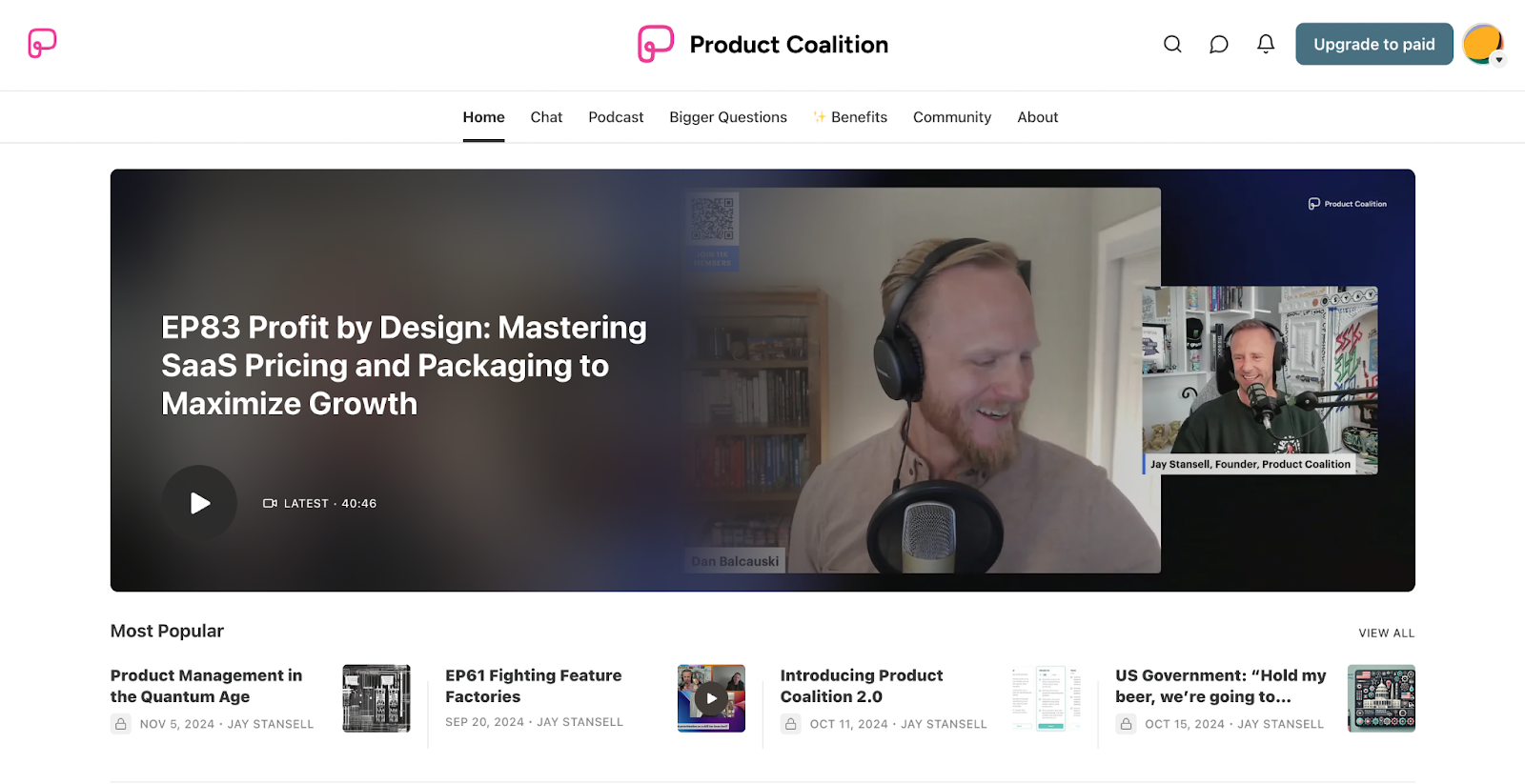 Homepage of Product Coalition: the world’s largest product management community. Offers educational, networking, and career support for PMs (Source: Product Coalition).
Homepage of Product Coalition: the world’s largest product management community. Offers educational, networking, and career support for PMs (Source: Product Coalition).While not a formal certification program, Product Coalition is one of the world’s largest unaffiliated product management communities. It blends education, networking, and career support for product professionals at all stages.
As a member, you gain access to editorial content, including over 3,000 community-created articles, 100+ hours of podcasts featuring industry leaders. You also get live workshops, webinars, and a growing library of 25+ micro-courses focused on AI, no-code, and low-code tools. These micro-courses come with verifiable certificates for LinkedIn and professional portfolios.
- Overview: Community-driven learning with resources and networking
- Practicality: Articles and discussions on PM challenges
- Networking: 7,000+ Slack members globally
Paid subscription plans offer deeper engagement, exclusive content, and direct support from peers and industry experts. This includes:
- Access to subscriber-only podcasts
- Open-office hours access and promotion
- Substack Chat + Lifestream access
Quiz: Which product management certification is right for you in 2025?
Picking the perfect product management certification can seem daunting, considering the financial and time commitment. Take this short quiz to find a PM certification course that matches your goals, learning style, and budget.
Q1: Where are you in your product management journey?
- Exploring PM: I’m curious about product management and want to test the waters.
- Switching careers: I’m transitioning from another role and need a structured path to break into PM.
- Advancing as a PM: I’m a mid- or senior-level PM looking to sharpen my strategic or tactical skills.
- Boosting credibility: I need a formal credential to stand out in enterprise or traditional industries.
Q2: What’s your learning style?
- Flexible and self-paced: I need a program I can fit around my schedule, ideally low-cost.
- Structured with feedback: I thrive with live instruction, instructor feedback, and cohort interaction.
- Hands-on and intensive: I want live sessions with practical exercises and real-world simulations.
- Exam-based and rigorous: I prefer a compact, academic approach with a focus on testing.
Q3: What’s your budget, and what value do you prioritize?
- Low cost, high flexibility: I want an affordable option that I can complete at my own pace.
- Moderate cost, high support: I’m willing to invest (~$2,000-$4,000) for career coaching and networking.
- High ROI, long-term value: I’m okay with higher costs if I get lifetime access or robust resources.
- Credential focus: I need a recognized certification, cost isn’t the main driver.
Q4: What gap are you looking to fill?
- Real-world experience: I need hands-on projects or a portfolio to showcase my skills.
- Credibility and brand: I want a certification from a well-known program to boost my resume.
- Career support: I need 1:1 coaching, portfolio reviews, or networking to land my next role.
- Enterprise recognition: I’m targeting traditional or regulated industries that value formal credentials.
Your results
Based on your answers, here’s the product management certification that’s the best fit for you.
- Mostly A’s
- Mostly B’s
- Mostly C’s
- Mostly D’s
How to maximize your PM certification ROI
You now know which product management certification to choose. But will it actually take your career forward?
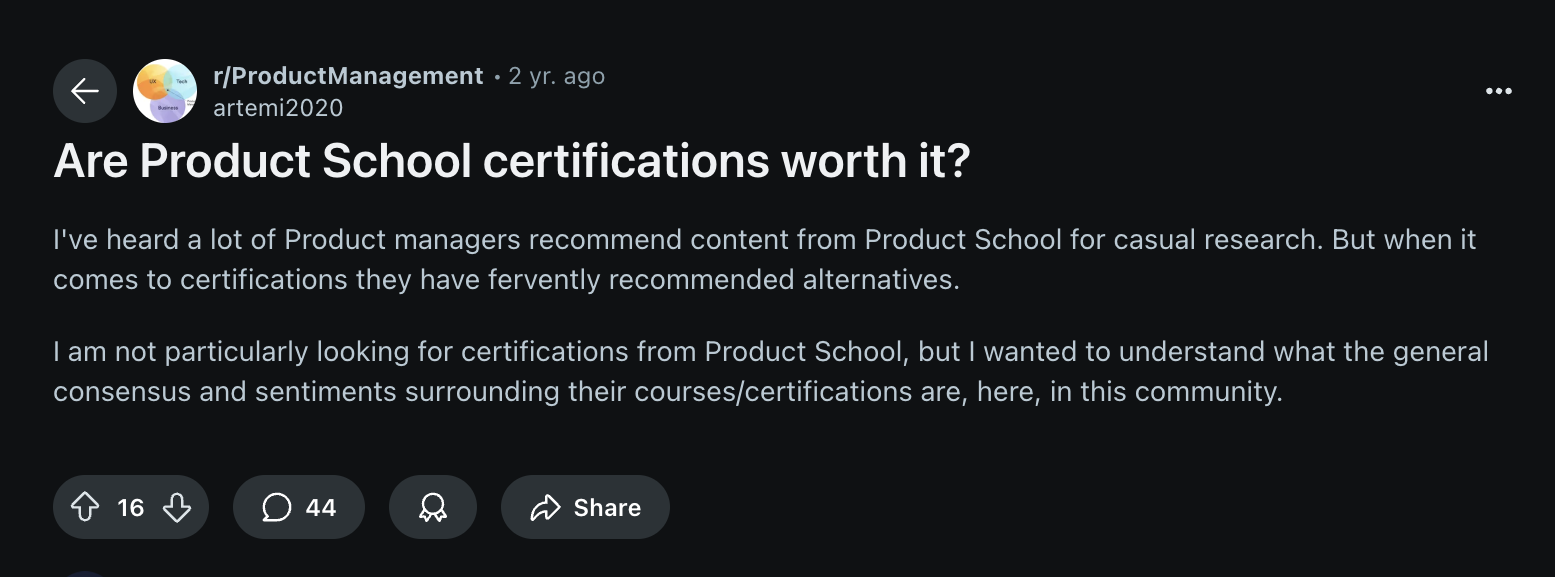 PM certifications and their value (Source: Reddit)
PM certifications and their value (Source: Reddit)A popular Reddit thread reveals a common split: while some PMs appreciate the structure certifications offer, others say the real value lies not in the curriculum, but in how (and if) you apply what you learn.
So, what’s the real takeaway? Certifications deliver real value only when you put them into practice.
While obtaining a certification can significantly boost your skills and credibility as a product manager, it's equally important to have the right tools that can help you apply those skills effectively.
Meegle: A tool that lets product managers do their jobs well
Meegle manages operational complexity like coordination, tracking, and adjustments, so you can focus on strategy and execution. As a project management platform built for complex environments, Meegle helps you apply your certification skills to real-world challenges.
1. Collaborative workspace
Certifications teach you to align cross-functional teams—but in practice, bouncing between Slack threads, spreadsheets, and email kills momentum.
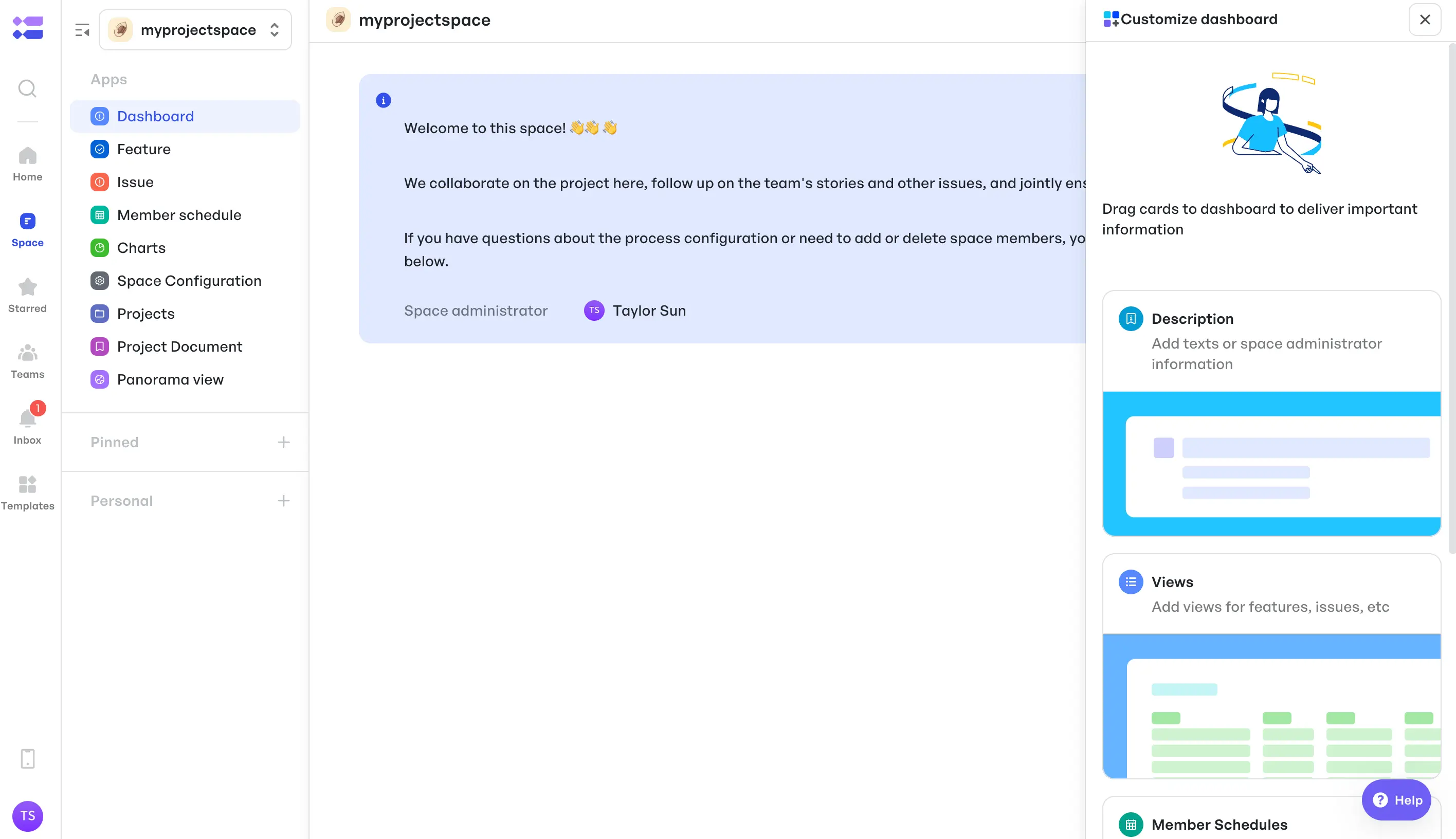 Meegle's workspace dashboard with navigation menu and team space customization tools for centralized project collaboration
Meegle's workspace dashboard with navigation menu and team space customization tools for centralized project collaborationMeegle centralizes team activity in a collaborative workspace where planning, discussions, and execution happen side-by-side. Planning a sprint? Assign tasks, clarify priorities, and track blockers, without switching tools or threads.
When stakeholders request updates, you don’t compile another report—you share a live workspace link. They get real-time visibility and granular insights. No status calls. No version control headaches. Just one view that updates itself.
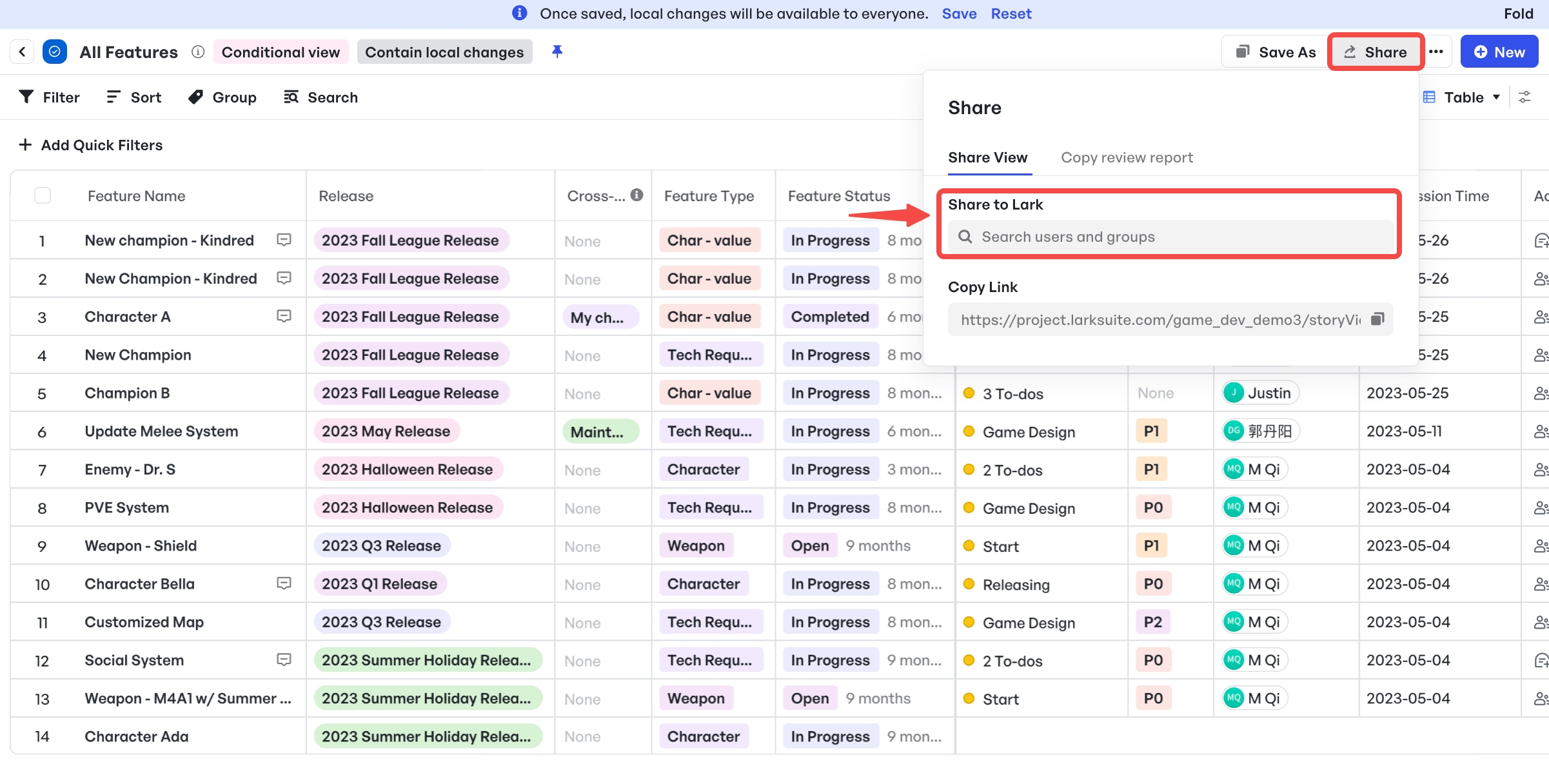 Meegle's feature tracking board showing task status and sharing options for stakeholder updates.
Meegle's feature tracking board showing task status and sharing options for stakeholder updates.2. Visual workflows
You're trained to manage dependencies, but in real projects, visualizing them is the hard part.
Meegle’s visual workflows give you a clear view to map every task and its downstream impact. Launching an update? Link design, dev, QA, and marketing steps into one connected, node-based workflow that tracks every dependency.
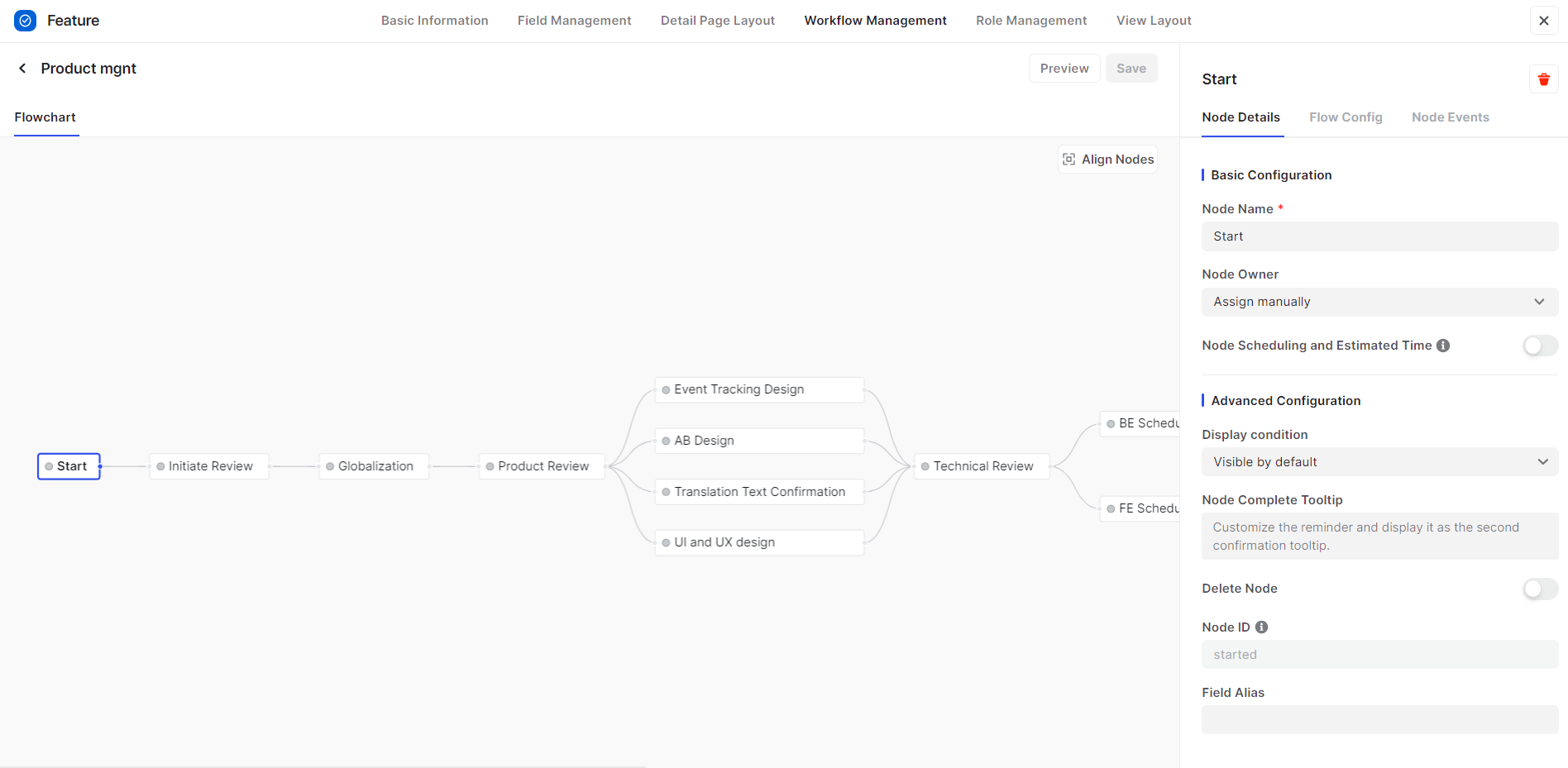 Meegle's node-driven workflow interface showing product development process with connected review stages and configuration options.
Meegle's node-driven workflow interface showing product development process with connected review stages and configuration options.If a design deadline slips, Meegle automatically flags the risk and impact on related tasks. That means you adjust before the scramble begins.
You don’t just plan for dependencies, you manage them.
Configuring advanced dependencies to automatically flag downstream impacts when tasks are delayed, enabling proactive management
3. Ready-to-use templates
Starting a project shouldn't mean starting from scratch. Meegle offers pre-built, customizable templates designed to jumpstart your workflows, whether you're in software development, manufacturing, customer service, or other industries.
Key templates include:
- Agile development: Manage epics, stories, sprints, and tasks with built-in workflows tailored for iterative progress and real-time metrics analysis.
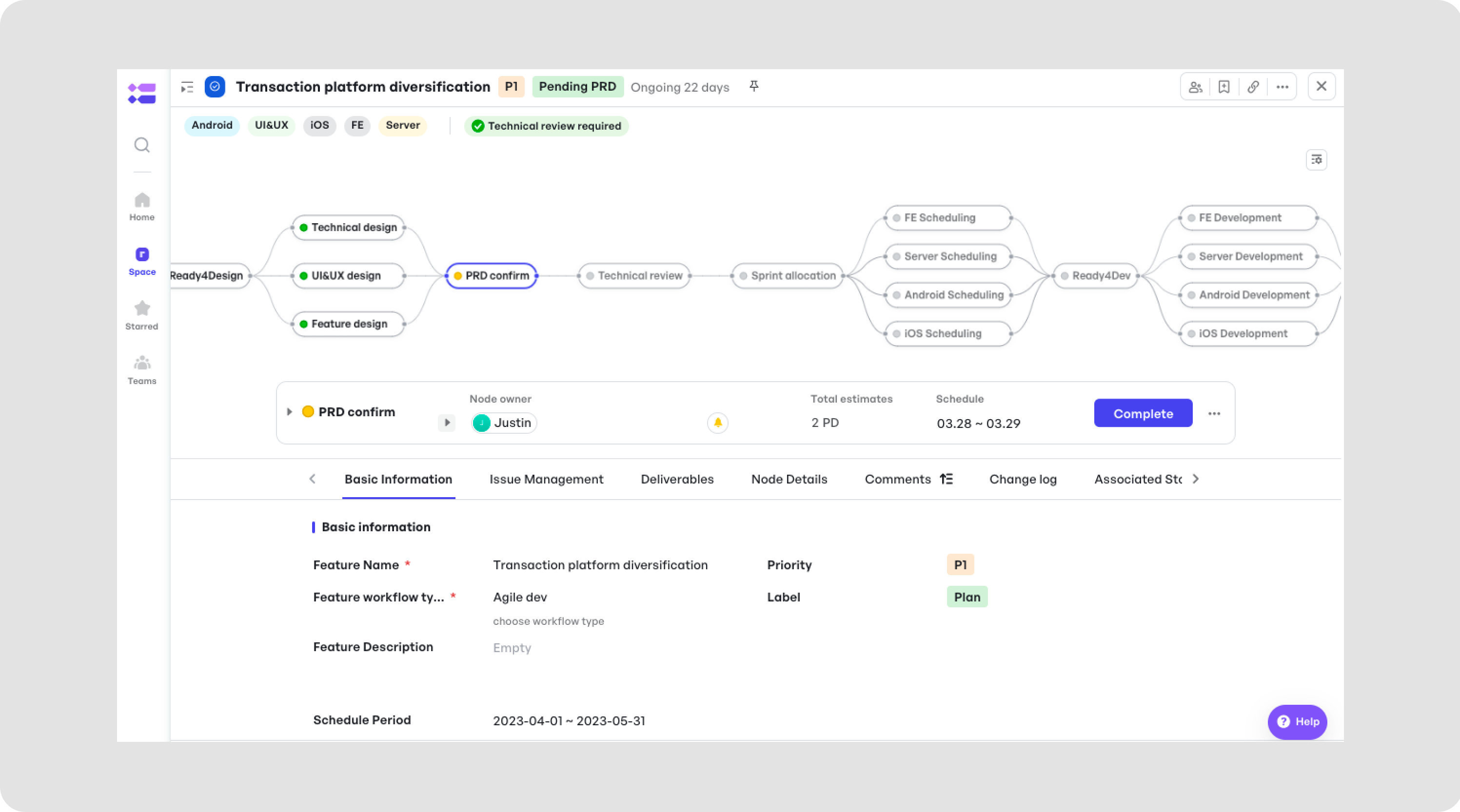 Agile development template: Visualized workflow showing cross-platform feature development with connected design and development nodes
Agile development template: Visualized workflow showing cross-platform feature development with connected design and development nodes- Feature management: Prioritize features, align cross-functional teams, and streamline development workflows for faster releases.
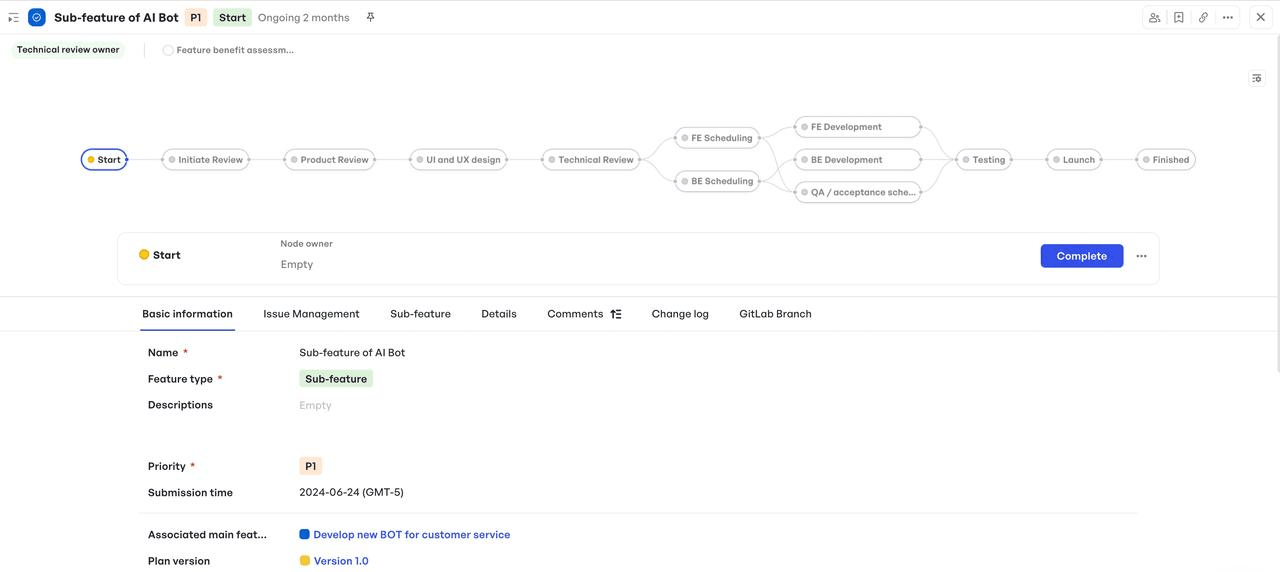 Feature management template shows sample workflow from initiation through development with clear stage progression
Feature management template shows sample workflow from initiation through development with clear stage progression- Issue resolution: Create a seamless pipeline from issue identification to resolution, suitable for customer service, IT support, QA, and product development teams.
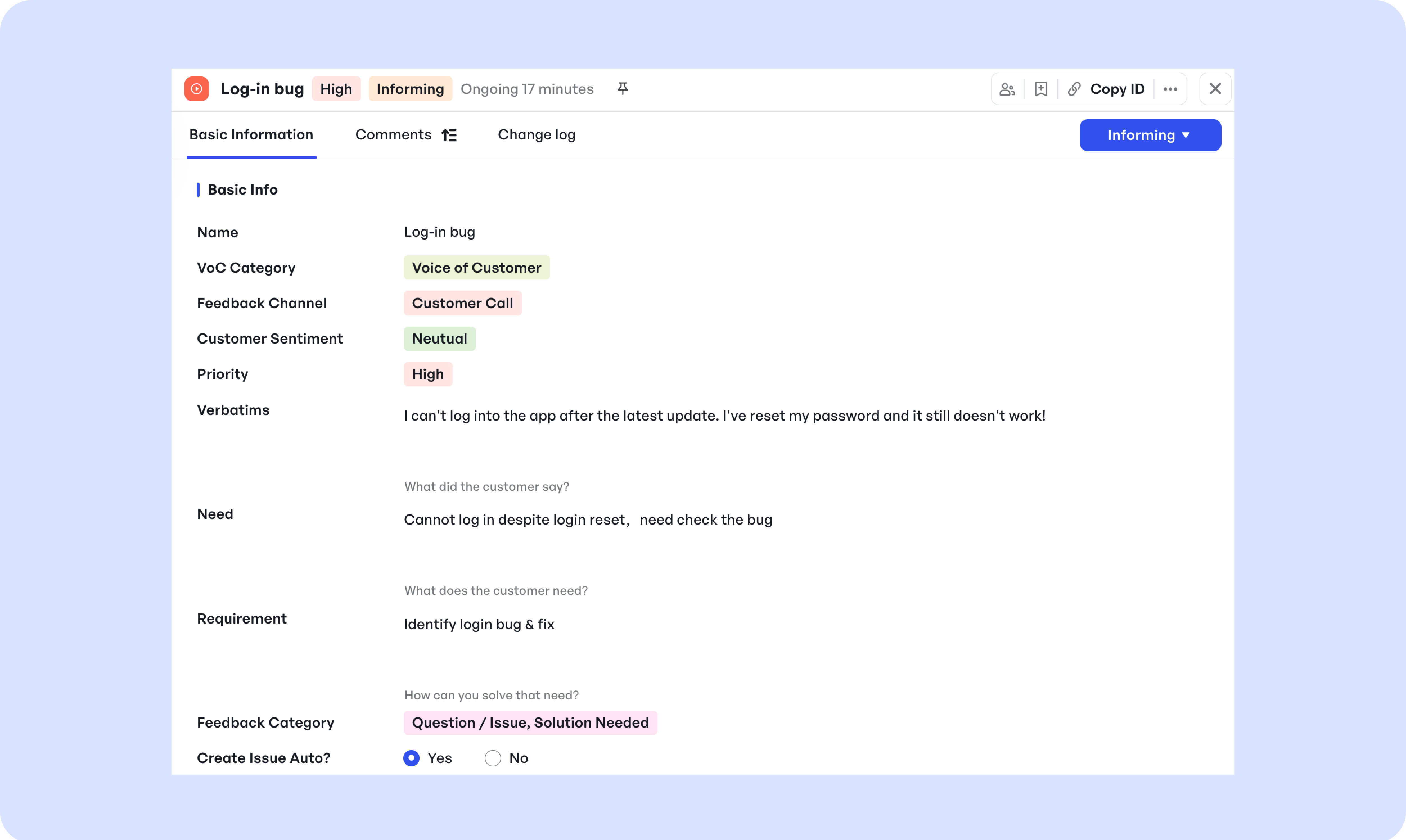 Issue resolution template: Customer bug report form with structured fields for tracking and prioritizing fixes
Issue resolution template: Customer bug report form with structured fields for tracking and prioritizing fixes- Manufacturing project plan: Streamline production processes with templates that include visualized manufacturing steps, risk management, and procurement tracking.
Meegle’s Manufacturing Project Plan Template with visualized steps, risk management, and procurement tracking
Each template is fully customizable, allowing you to adapt workflows to your team's specific needs. This flexibility ensures that you can maintain consistency across projects while accommodating unique requirements.
By using Meegle's ready-to-use templates, you can reduce setup time, minimize errors, and focus more on execution and delivery.
4. Adaptive product roadmaps
Static roadmaps are a trap. You know you need flexibility, but without the right tools, even the best-planned strategy falls apart when priorities shift.
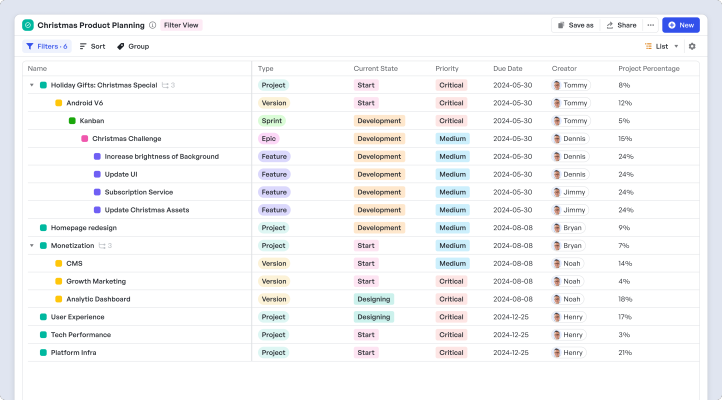 Meegle’s product roadmap view: Product planning with hierarchical tasks, priorities, and progress tracking for adaptive timeline management
Meegle’s product roadmap view: Product planning with hierarchical tasks, priorities, and progress tracking for adaptive timeline managementMeegle’s adaptive roadmaps adjust in real time. When leadership adds a new feature mid-quarter, you can make changes to the roadmap, reassign related tasks, and instantly see the impact on timelines.
With Meegle's scheduling tools, you gain clear visibility into task dependencies, critical paths, and overlapping schedules. This enables you to identify potential bottlenecks early and make informed decisions to keep the revised roadmap on track.
Teams are notified about changes automatically, and you can discuss trade-offs in the same workspace.
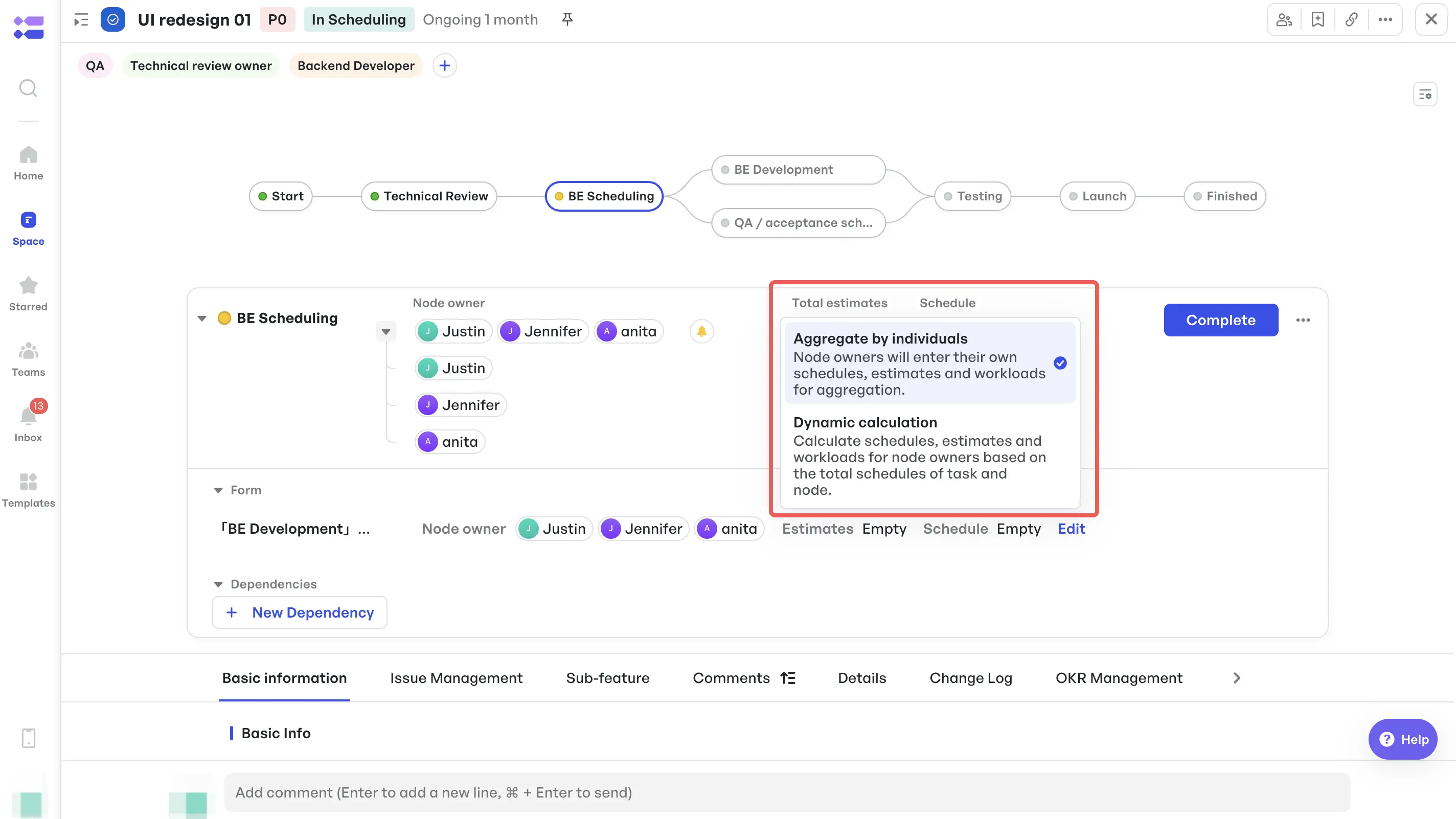 Resource scheduling on Meegle: workflow with team assignments and dynamic workload calculations to identify potential bottlenecks
Resource scheduling on Meegle: workflow with team assignments and dynamic workload calculations to identify potential bottlenecks5. Automated notifications
A common challenge in cross-functional collaboration is when one team finishes their task, but the next doesn’t start until someone nudges them. That lag? It adds up.
Meegle eliminates manual handoffs with automated stage transitions. When designers complete wireframes, the relevant stakeholder approves them, triggering instant alerts to developers. Once dev wraps up, QA is notified automatically. No emails, no Slack threads, no missed steps.
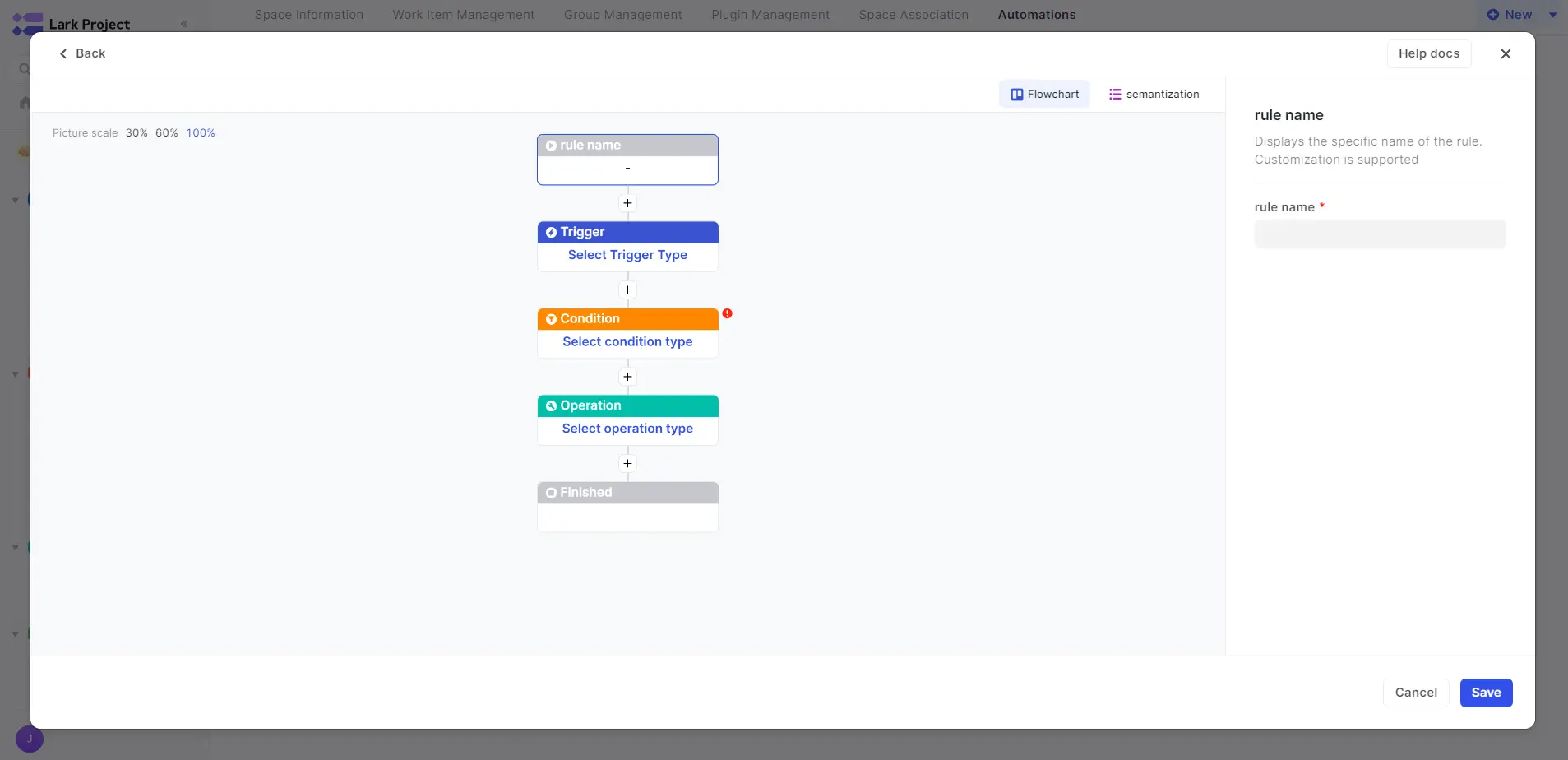 Set up conditional automation on Meegle: visual workflow creator for setting up trigger-based task transitions to eliminate manual handoffs between teams.
Set up conditional automation on Meegle: visual workflow creator for setting up trigger-based task transitions to eliminate manual handoffs between teams.Each update adjusts timelines and dependencies in real time, keeping your roadmap set and your teams moving.
The result? You spend less time coordinating and more time leading.
6. Prioritization tools
Product management certifications teach frameworks like RICE or MoSCoW, but here's what they don't prepare you for: sorting through a backlog stuffed with feature requests from sales, engineering, and leadership while everyone insists their idea is "critical." It feels like herding cats with spreadsheets.
Meegle's Feature Management Template helps manage such conflicts. Instead of drowning in competing priorities, you can score features systematically and get everyone aligned on what matters most.
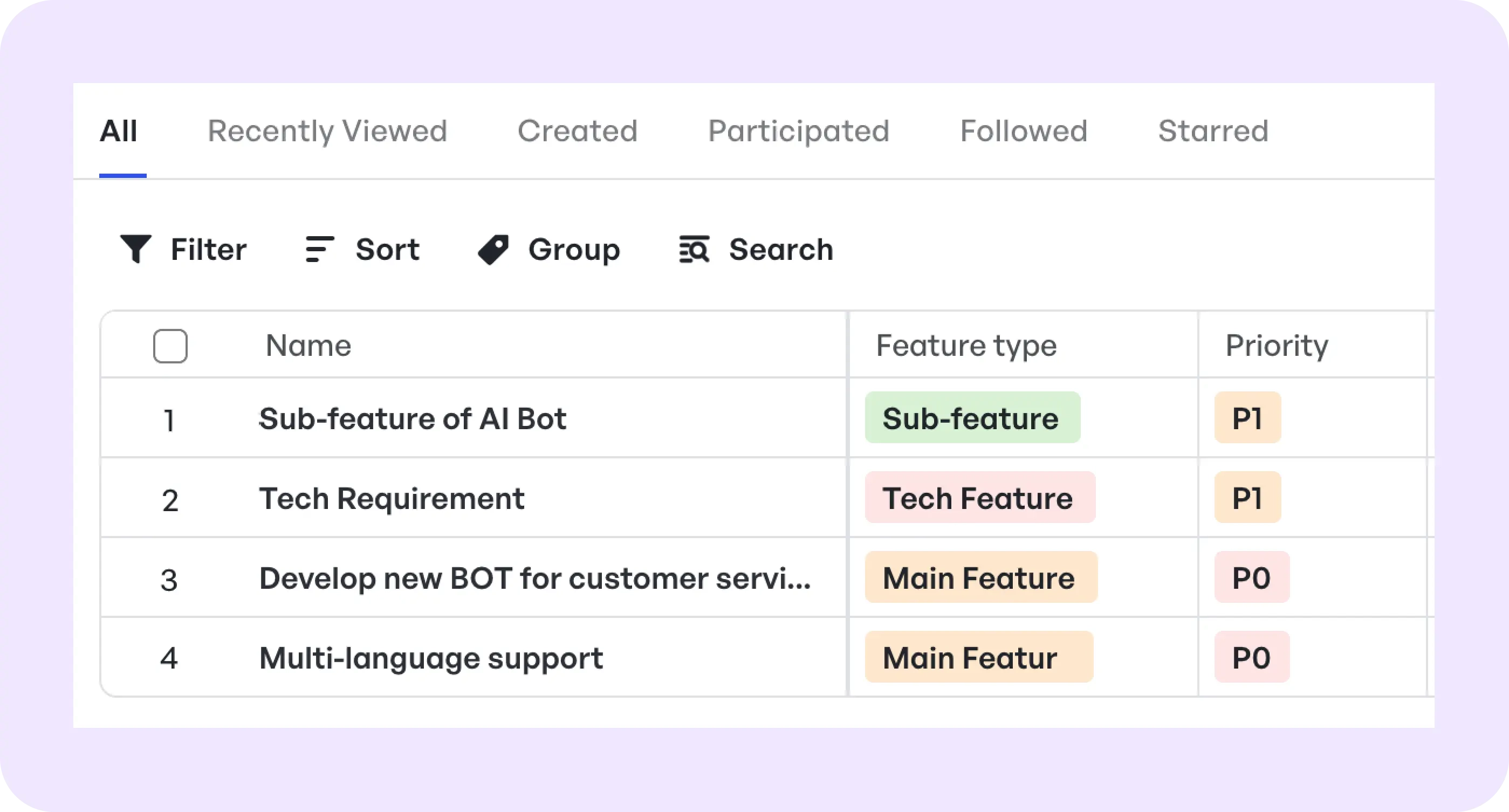 Feature backlog with prioritization on Meegle: tasks categorized by feature type and priority level for sprint planning.
Feature backlog with prioritization on Meegle: tasks categorized by feature type and priority level for sprint planning.Here's how it works in practice.
- You have 60+ feature ideas cluttering your backlog.
- You load these into Meegle's template and score each one based on business impact like revenue growth, customer value such as user engagement, and feasibility including dev effort.
- Set your weights—40% customer value, 40% impact, 20% feasibility—and Meegle prioritizes high-value features over nice-to-haves automatically.
For teams dealing with complex data projects, Meegle's BI Backlog Prioritization Matrix Template provides extra structure. You categorize tasks by impact and urgency. The matrix shows high retention impact clearly, making priority decisions obvious to leadership.
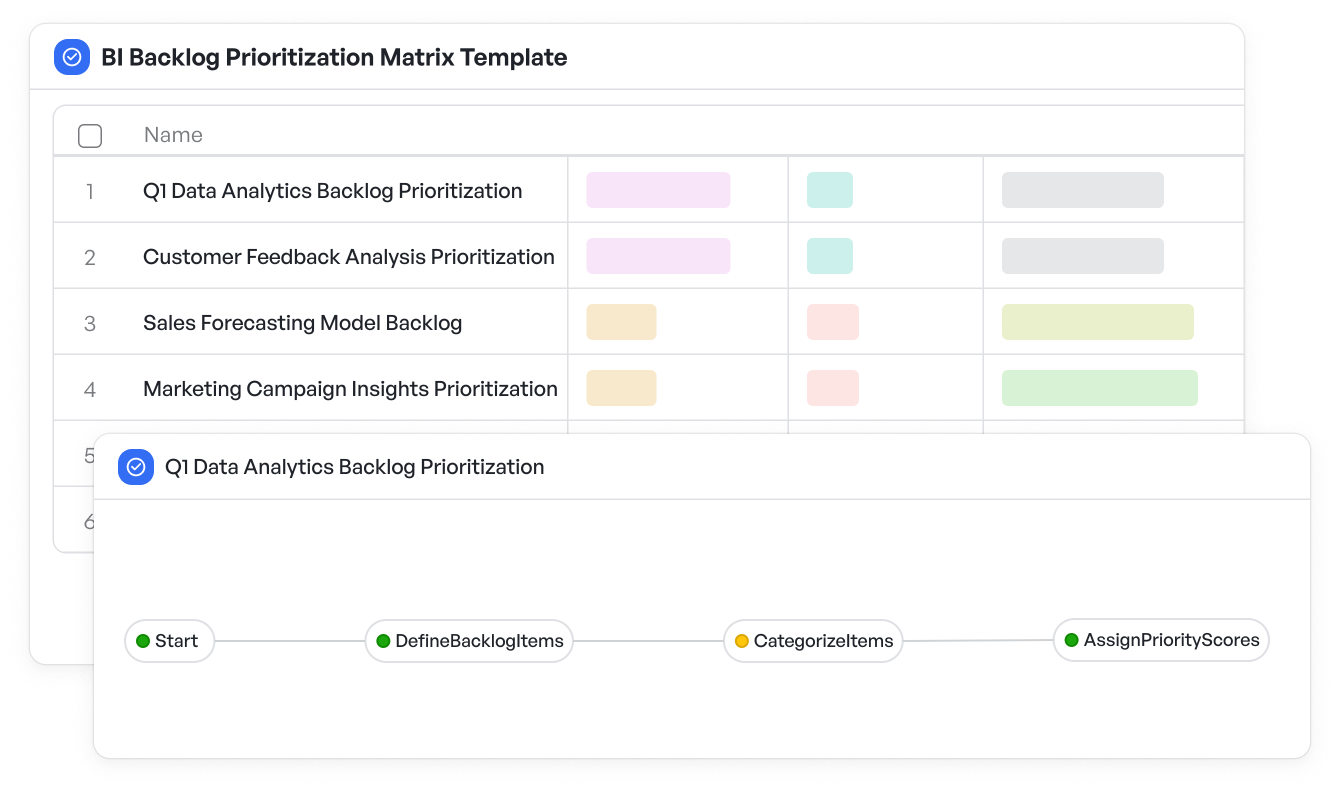 Meegle's BI Backlog Prioritization Matrix Template: tasks categorized by impact and urgency with workflow stages for structured decision-making.
Meegle's BI Backlog Prioritization Matrix Template: tasks categorized by impact and urgency with workflow stages for structured decision-making.But scoring is only half the battle. Getting stakeholder buy-in is where most PMs get stuck in endless debates.
When multiple teams have different views on which features should ship first, instead of another marathon meeting, you set up a vote in Meegle. Relevant stakeholders vote, and you get a clear consensus.
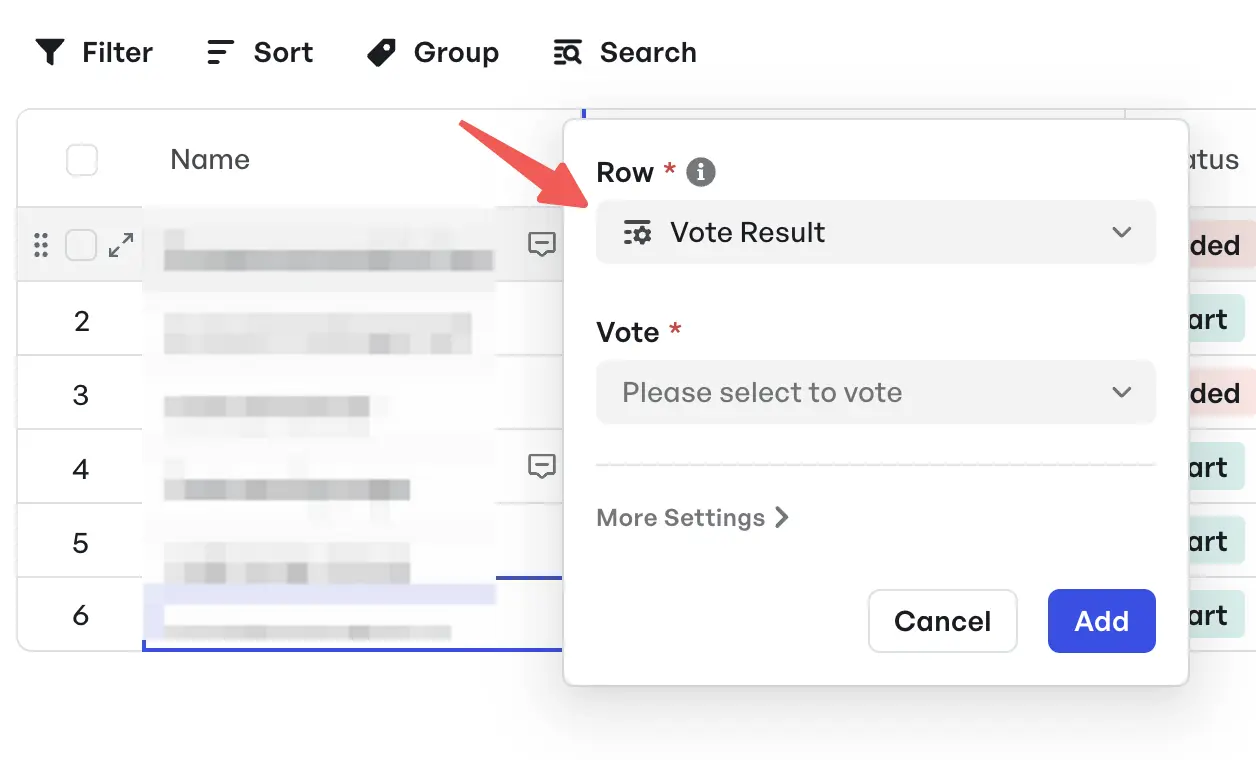 Meegle's voting interface: setting up stakeholder votes on feature priorities.
Meegle's voting interface: setting up stakeholder votes on feature priorities.7. Feedback loops
Customer-centric development is central to a product’s success. However, implementing feedback loops is often a disjointed process. Especially when your project management platform lacks built-in support. Meegle addresses silos with seamless integrations to third-party tools like Typeform, Airtable, Intercom, and more via webhooks and APIs.
Whether it's a reported bug or a product suggestion, user feedback is tied-in to your workspace as a task. From there, you can assess severity, prioritize based on urgency or impact, and slot it into your sprint backlog using Meegle’s structured planning templates.
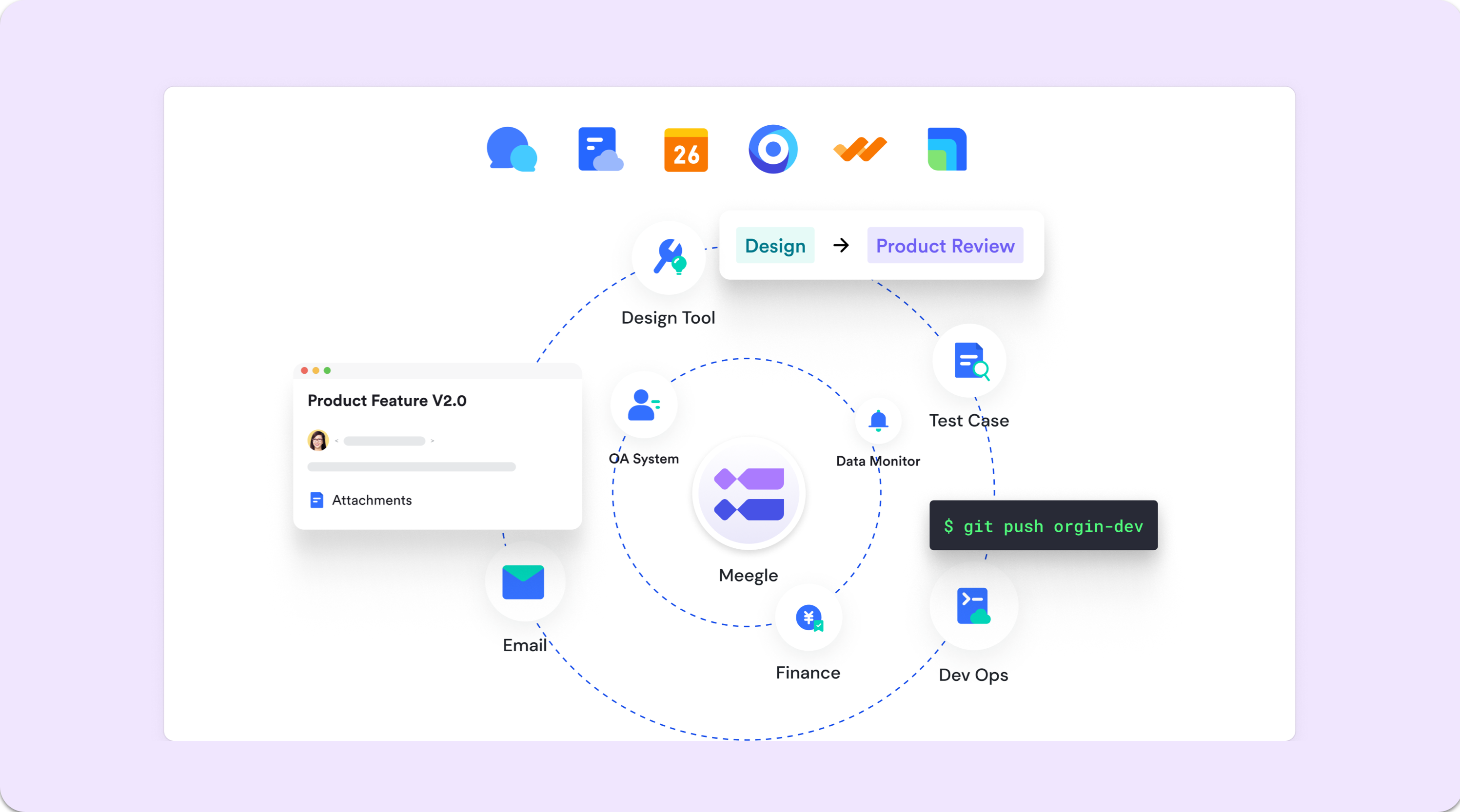 Meegle's integration ecosystem: connected workflow showing design tools, QA systems, and development platforms collaborating around feature management.
Meegle's integration ecosystem: connected workflow showing design tools, QA systems, and development platforms collaborating around feature management.No more copy-pasting user quotes into spreadsheets or hunting down email threads. Meegle centralizes your workflow from customer report to prioritized ticket to in-sprint deliverable and post-release follow-up. With real-time updates and customizable workflows, you’ll resolve issues faster, maintain clear audit trails, and have confidence that you’re building exactly what users asked for.
8. Early warning systems
Risk management might seem manageable in theory, but in practice, manually spotting issues often means you're already behind. Meegle's dashboards proactively highlight potential bottlenecks before they affect your timelines.
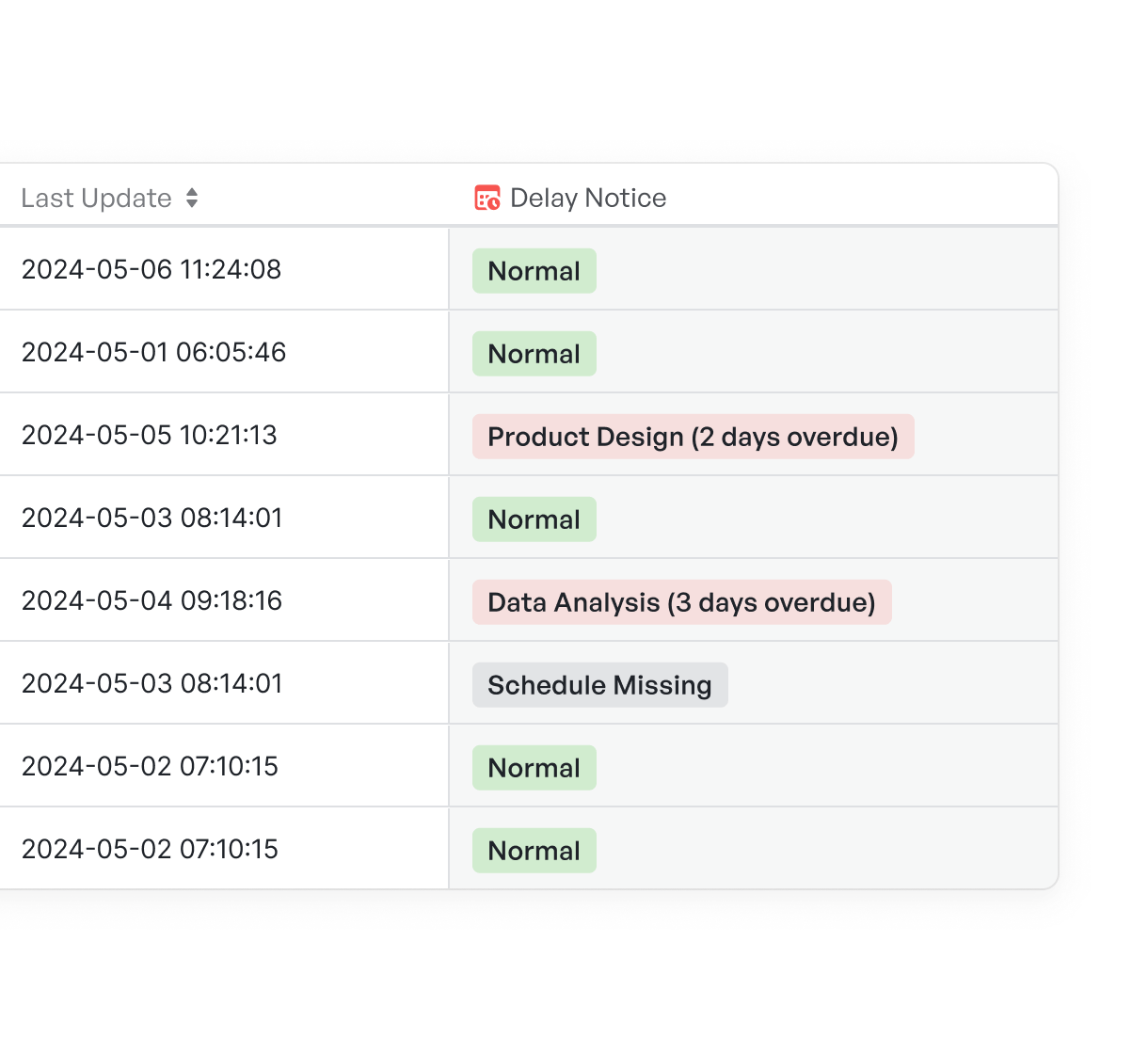 Meegle’s proactive monitoring system highlighting overdue tasks and issues to prevent bottlenecks.
Meegle’s proactive monitoring system highlighting overdue tasks and issues to prevent bottlenecks.For instance, when facing tight deadlines, Meegle's monitoring system alerts you if a team member’s task queue exceeds capacity, potentially impacting multiple dependent tasks. You can then redistribute work and adjust dependencies to maintain momentum.
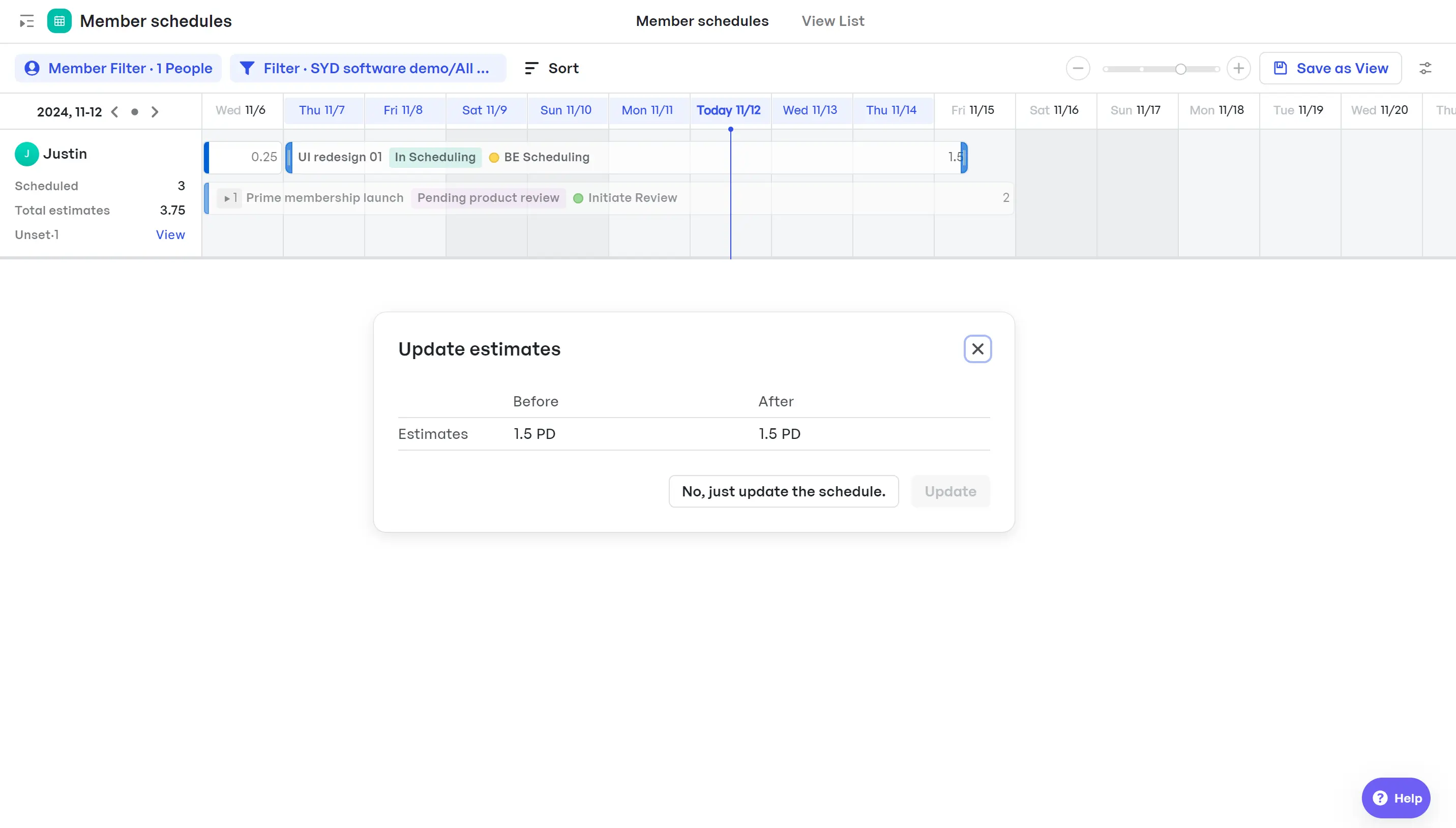 Meegle’s member scheduling view showing task assignments with time estimates and option to update scheduling requirements.
Meegle’s member scheduling view showing task assignments with time estimates and option to update scheduling requirements.Meegle helps you take a proactive approach to product management with real-time visibility into roadblocks, ensuring smoother project delivery.
While certifications provide valuable skills and networking opportunities, the real challenge lies in applying those lessons effectively. Platforms like Meegle help you implement your knowledge while enabling faster execution, better team alignment, and clearer visibility into what truly drives success.
Support your product management certification with Meegle’s tools that bridge learning and real-world execution.
FAQs
1. Is a product management certificate worth it?
Yes, a product management certificate is worth it for building essential skills, gaining industry recognition, and accelerating career growth. Certification helps you stand out to employers and increases your earning potential in a competitive job market.
2. Is CPM certification worth it?
CPM certification is highly valuable for product managers seeking career advancement, higher salaries, and industry credibility. It demonstrates your expertise, commitment, and ability to lead product initiatives, making you a preferred candidate for top roles.
3. What are the 5 P's of product management?
The 5 P’s of product management typically refer to product, price, place, promotion, and people. These pillars guide product managers in developing, positioning, and delivering successful products that meet market and customer needs.
4. What is the CPM certification?
The Certified Product Manager (CPM) certification is a globally recognized credential that validates comprehensive product management skills, from ideation to launch. It demonstrates expertise in market analysis, product strategy, and lifecycle management, setting professionals apart in the field.
The world’s #1 visualized project management tool
Powered by the next gen visual workflow engineRead More
Check All BlogsStart creating impactful work today
